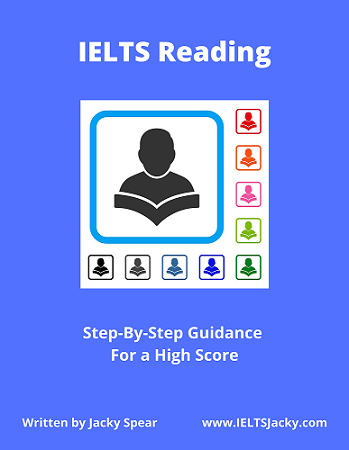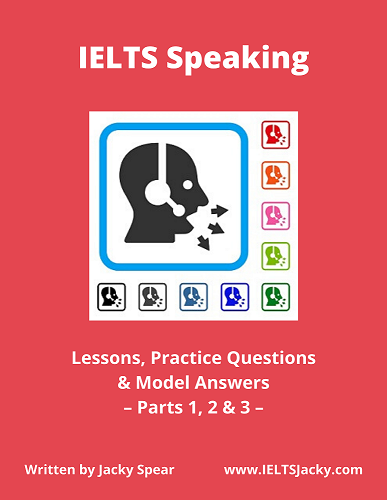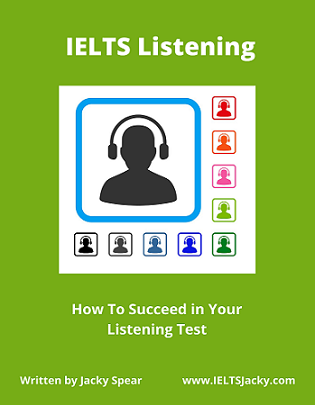IELTS Reading Practice
What’s the best approach to IELTS reading practice?
There are several things that are important to include in your preparation. Here are the top 5:
1) Understand the format of the test.
2) Learn how to answer the 12 different types of questions.
3) Complete IELTS reading practice tests.
4) Learn key reading skills.
5) Read every day.
We’re going to look at these in detail and I’ll give you the best resources to use for each one. You’ll find most of the help without even having to leave this website.
# 1 Understand the Format of the Test
The first step in your preparation for the reading test is to understand the test itself. Unless you know the structure of the exam, what you’ll be assessed on and how you’ll be assessed, you’re not likely to achieve a high score.
I’ve written a whole page on this topic. It covers:
- The format of the test
- Question types
- The marking system
- Skills assessed
- Success strategies
- Key reading skills
- How to complete the answer sheet
- Which test to choose – Academic or General
Don’t begin your IELTS reading practice without knowing this.
Click the link to visit this page – The IELTS Reading Test
# 2 Learn How To Answer The 12 Different Types Of Questions
It’s vital that you know how to answer the twelve different types of IELTS reading questions.
They vary in form and many of them require completely different strategies to answer them quickly and effectively.
To help you, I’ve created a page of step-by-step instructions for each question type. They all include at least one IELTS reading practice question, most from past test papers.
Where I've been unable to find genuine IELTS practice tests that are available for free on the official websites, I have created IELTS-style practice questions myself. These are clearly labelled as such.
Follow these links to start learning right away.
Step-by-step strategies with examples and practice tests
# 3 IELTS Reading Practice Tests
A major part of your test preparation should be the completion of genuine IELTS reading practice tests. There are just two authentic sources of real past exam papers:
1) The official IELTS websites
I’ve created step-by-step instructions on how to answer many of these real practice tests in the ’12 question types’ pages listed above and also on my other question strategy pages. They're listed below.
Click the links for lots more tips and techniques for getting high marks in the IELTS reading test.
IELTS Reading Sample – True, False, Not Given sample test
IELTS Reading Samples – Matching Headings & Diagram Labelling sample tests
IELTS Reading Exercise – Yes, No, Not Given sample test
IELTS Reading Practice Test – More examples of Matching Headings and a Diagram Labelling questions & how to answer them
More Reading Test Practice – Matching Information sample test
IELTS Reading Tests – Two strategies for answering Name Matching questions
IELTS Reading Paper – Multiple Choice sample test
Reading Tests For IELTS – Summary Completion test
2) Books of IELTS reading practice tests published by Cambridge English
Cambridge English creates the IELTS exam questions and each year they publish a new book of past questions for students to use for practice. Each book contains four complete tests covering the four sections of the exam – Reading, Speaking, Writing and Listening.
These books are invaluable for exam preparation and I recommend buying several if you can afford them. You can buy them on Amazon as well as from other sources.
Cambridge English also produce a range of other helpful publications.
Check out some of their books via these links:
# 4 Learn Key Reading Skills
There are three key reading skills that you need to master in order to do well in the reading test. These are:
- Skimming
- Scanning
- Detailed reading
They will enable you to quickly understand the texts and find the location of the answer to each question.
There are also two other things you need to understand for a high score:
- How to use context
- The importance of ‘topic sentences’
I teach all these vital skills on the IELTS Reading Skills page of the website. Study the lessons and use the skills in your IELTS reading practice.
# 5 Read Every Day
Finally, you need to read something in English every single day. I don’t mean several chapters of a book or a whole magazine. Just a short article each day will greatly improve many areas of your knowledge and skill, especially:
- Vocabulary
- Grammar
- Topic knowledge
- General comprehension
- Overall level of English
Students often ask me what they should read and here is my advice.
1) Read something you find interesting. This will make it more enjoyable and keep you better motivated to read every day.
It could be a magazine or online articles on your favourite topic. Newspapers are ideal as they cover a wide range of subjects, so you’re bound to find something you’re interested in.
2) Material on specific topics that appear regularly in the IELTS exam such as technology, education, health and the environment.
This will be invaluable preparation for the Speaking, Writing and Listening sections of the exam as well.
Where can you find the best resources? Online of course.
If you have access to printed resources such as books, newspaper, magazine and brochures, make full use of these, but you can find everything you need by searching Google. There are articles on every subject you could imagine
There are, however, some key websites that I recommend. For example:
You’ll find these, and lots more, listed on my Resource Page.
Active Reading
In order to make the very best use of your reading time, use the technique known as ‘active reading’. This means really engaging with the text and actively learning from it.
There are many things you can focus on, but vocabulary and grammar are two key aspects. Here are a few tips as to what you can do.
Vocabulary
1. Underline new words and phrases.
2. Try and guess the meaning from context
3. Record the new word or phrase in your vocabulary notebook along with common collocations, synonyms and an example sentence.
For the ultimate guide on How To Learn Vocabulary For IELTS, click this link.
Also, discover the Top 6 Types of Vocabulary You Need to Learn for IELTS.
Grammar
1. Underline grammar structures that are unfamiliar to you or where you don’t understand why the author used it.
2. Try and understand the grammar from the context of the sentence.
3. If you are unable to fully understand it, look it up in a grammar book or grammar website.
4. Construct a sentence of your own using the grammar rule or structure.
So as not to get overwhelmed or spoil the flow of your reading, choose one thing to focus on each time you read. Perhaps make a commitment to learn one new word or understand one unfamiliar grammar structure.
Keep Practicing
If you follow these suggestions for your IELTS reading practice and use all the resources, you can be confident of a high score in your test.
More Help With IELTS Reading Practice
Top 7 IELTS Reading Tips – Each tip will take you a step closer to the high score you want. They are the key to top marks in your test.
9 More Tips For IELTS Reading – Learn valuable practice techniques & discover a secret that may gain you extra marks.
How to Complete the IELTS Reading Test in 60 Minutes – Top 6 Recommendations.







